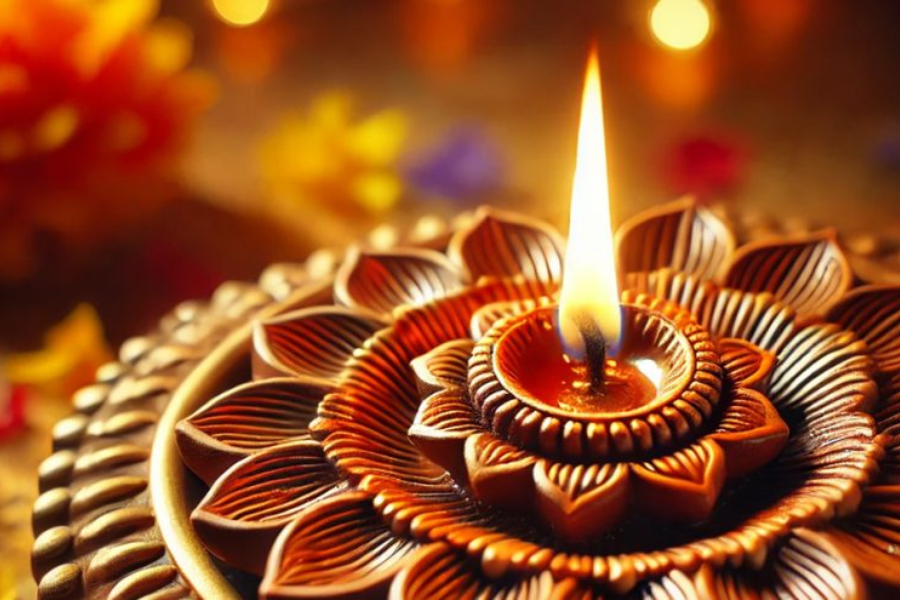Vavilaku in Tulu: Illuminating the Cultural Heritage of a Vibrant Community
The Tulu-speaking community, predominantly residing in the southwestern coastal region of Karnataka, India, is celebrated for its rich cultural heritage and vibrant traditions. Among the numerous cultural symbols that define this community, the Vavilaku holds a place of profound significance.
More than a mere source of illumination, this traditional oil lamp embodies knowledge, prosperity, and spiritual enlightenment. It serves as a crucial element in the community’s rituals, festivals, and everyday life. In this article, we delve into the origins, cultural significance, and enduring relevance of the Vavilaku within Tulu culture.
The Tulu Community: An Overview
To understand the significance of the Vavilaku, it is vital first to explore the Tulu-speaking community and its cultural landscape. Tulu Nadu, the region where this community thrives, spans the districts of Dakshina Kannada and Udupi in Karnataka. The Tulu language, a member of the Dravidian family, is spoken by approximately 1.8 million people.
The Tulu community’s cultural identity is deeply rooted in folklore, traditional music, dance, and unique rituals. These traditions, passed down through generations, paint a vivid tapestry of the community’s way of life, which is intrinsically tied to nature and spirituality.
The Origin and Evolution of Vavilaku in Tulu Culture
Historical Roots
The Vavilaku has been an integral part of Tulu culture for centuries, dating back to a time when agriculture was the community’s primary occupation. This traditional oil lamp was believed to symbolize divine presence, ensuring prosperity and safeguarding the community.
Initially crafted from simple earthenware, the Vavilaku evolved over time. With advancements in craftsmanship, these lamps began to feature intricate designs, often made from durable materials like brass and bronze. Today, many Vavilaku are treasured family heirlooms, reflecting the lamp’s enduring importance in Tulu households.
Cultural Significance
The Vavilaku holds a profound spiritual meaning within Tulu culture, representing the triumph of light over darkness and knowledge over ignorance. It is central to various rituals and ceremonies, acting as a bridge between the physical and spiritual realms. The lamp’s light is believed to ward off evil spirits, invite divine blessings, and bring good fortune.
The Role of Vavilaku in Tulu Festivals and Rituals
Kambala and Vavilaku
Kambala, the exhilarating buffalo race held in waterlogged paddy fields, is one of Tulu Nadu’s most celebrated festivals. Beyond its status as a rural sport, Kambala is a significant cultural event that unites the community. The lighting of the Vavilaku marks the commencement of the festivities, with prayers seeking divine blessings for a successful and prosperous event.
The lamp’s light serves as a beacon of positivity, ensuring the smooth conduct of the festival. It also symbolizes the community’s gratitude for nature’s bounty, which sustains their agrarian way of life.
Bhoota Kola and Vavilaku
Another quintessential ritual in Tulu culture is Bhoota Kola, a dramatic and vibrant ceremony dedicated to the worship of local spirits, or Bhootas. The Vavilaku plays a pivotal role in these ceremonies, as its light signifies the presence of divine entities.
During a Bhoota Kola, the Vavilaku is lit to guide the spirits and deities, ensuring their benevolence and protection for the community. This ritual, steeped in spirituality, showcases the Tulu people’s reverence for their ancestral deities and their deep connection to the divine.
Daily Rituals and the Vavilaku
Everyday Significance
The Vavilaku is not limited to grand festivals; it is an essential part of daily life in many Tulu households. Lighting the lamp at dusk is a customary practice, believed to dispel negative energies and invite prosperity.
Typically placed in the prayer room or near the house’s entrance, the lamp symbolizes the welcoming of positive energies and divine blessings into the home. This simple yet profound ritual underscores the community’s belief in the transformative power of light.
Special Occasions
On auspicious occasions such as weddings, housewarming ceremonies, and religious observances, the Vavilaku assumes even greater significance. It is central to various rituals that bless the event and ensure the well-being of participants.
The presence of the Vavilaku is considered auspicious, and its light is believed to bring success and harmony. Whether placed at the center of a ceremony or used as part of intricate rituals, the Vavilaku continues to be a symbol of divine grace.
The Contemporary Relevance of Vavilaku in Tulu Culture
Preservation of Tradition
Despite rapid modernization, the Vavilaku remains a cherished symbol of Tulu cultural heritage. It represents the community’s enduring connection to its traditional values and spiritual beliefs.
During festivals like Deepavali, the tradition of lighting oil lamps continues to thrive, emphasizing the cultural importance of the Vavilaku. In contemporary households, these lamps often serve as reminders of ancestral traditions, bridging the gap between past and present.
Modern Celebrations and the Vavilaku
In today’s fast-paced world, the Vavilaku finds its place in modern celebrations, blending traditional practices with contemporary lifestyles. The lamp is prominently displayed during major festivals, and its significance is highlighted through community workshops and cultural events.
Such initiatives ensure that younger generations understand and appreciate the Vavilaku‘s role in Tulu culture. By fostering awareness, the community safeguards this symbol of light and knowledge for future generations.
The Symbolism of Vavilaku in Tulu Spirituality
Light as a Spiritual Symbol
The flame of the Vavilaku is a powerful spiritual symbol in Tulu culture, representing the light of knowledge that dispels ignorance. Lighting the lamp is often accompanied by prayers and offerings, reinforcing the belief in divine presence.
The Vavilaku serves as a reminder of spiritual values central to Tulu culture, emphasizing the importance of purity, enlightenment, and faith.
Connection to Nature and Deities
Tulu spirituality is deeply intertwined with nature and the worship of local deities. The Vavilaku, with its radiant light, symbolizes this connection.
Whether during agricultural festivals like Kambala or rituals dedicated to Bhootas, the Vavilaku remains a constant presence, representing the community’s reverence for the natural world and its deities.
Conclusion
The Vavilaku in Tulu culture is far more than a traditional oil lamp; it is a profound symbol of the Tulu-speaking community’s rich heritage and spiritual identity. From its historical origins to its role in contemporary celebrations, the Vavilaku continues to illuminate the lives and traditions of this vibrant community.
By preserving and promoting the use of the Vavilaku, the Tulu community ensures that their cultural heritage endures despite modern challenges. The lamp’s light not only dispels physical darkness but also serves as a beacon of hope, faith, and knowledge.
As we explore and celebrate the traditions of the Tulu people, the Vavilaku stands as a timeless symbol of their values and identity—a radiant testament to their enduring cultural tapestry.
Stay connected with the latest news and stories from London at london daily.




